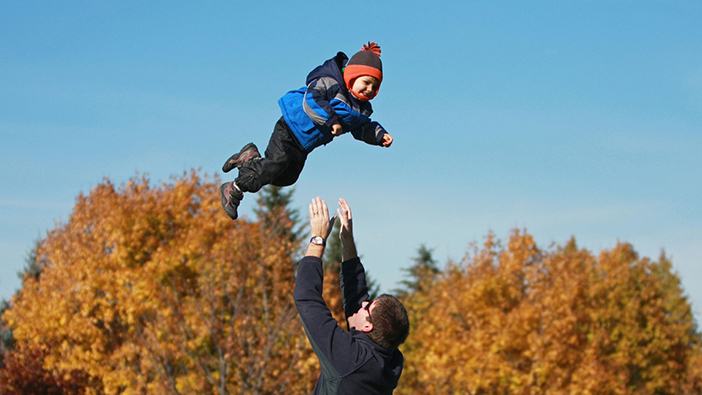Dads really get a bad rap, especially in TV and films geared towards families. The trope of the absentee or deadbeat dad is so pervasive that it often seems like a lazy way to motivate your protagonist. Think of your top five movies and then try to name one whose dad is a good influence, or even alive.
These images of dads have bothered my husband Dan Jenkins since before he became one. As he describes it, “American media gave me nothing to aspire to as far as how to Dad. I was raised with representations of fathers as buffoons at best and incompetent at worst: Al Bundy, Homer Simpson, Michael Keaton in Mr. Mom. On the other end of the spectrum were the harsh sports dads which I had zero time for.” Let’s not even get into the gender inequality of the trope.
Unfortunately, living internationally tends to exacerbate these stereotypes, since 85 percent of families move for the father’s job, leaving their partner with that oh-so-lovely tag of “trailing,” according to the 2013 International Surveys from the Permit Foundation. Being the primary breadwinner of a family, sometimes for the first time, and often on project-based assignments, may require longer work hours and more time away from the family, which can inhibit your available playtime.
What most studies of parental involvement will tell you, however, is that it isn’t always the quantity of playtime that is most effective, but the quality of the time that you spend with them. And when your window of playtime is so small, it’s even more important to make the most of that time.
The importance of playtime with dads has been a topic of great interest in parenting studies as of late. Multiple studies show a direct link between playtime with Dad (starting from one month old) and improved cognitive development in children. Although studies show that focused playtime with Dad tapers off between the ages of 8 and 13, it’s up to the dad to forge new ways to bond and play with their children. After all, there are numerous benefits, such as:
 “Dads just do it different…”
“Dads just do it different…”
Those are the wise words from my birthing teacher, herself a mother of eight children. She was appalled, she said, when she returned from a walk to find her husband was dunking their young baby in and out of the kitchen sink vigorously to give him a bath. She had to stop and force herself to take a breath, and that’s when she noticed her son laughing hysterically.
“And you know what,” she told her class of soon-to-be parents, “that child is the best swimmer of the bunch!”
Dads need their own time to develop how they and their children like to play, allowing it to mature and change as the relationship grows.
Playtime with Dad Helps Children Develop Self-Control
“Children who enjoyed high-quality playtime with their fathers were less likely to exhibit hyperactivity or emotional and behavioral problems. They also appeared to be better at controlling their aggression, and less prone to lash out at other children during disagreements at school,” according to a June 2020 University of Cambridge study.
No one is born knowing how to regulate their emotions; it takes practice and exposure to a number of feelings in various kinds of situations. In effect, playing with Dad can be a rehearsal for the schoolyard.
Rough and Tumble Play Aids in Pro-Social Behavior
“Pro-social behavior includes things like being considerate of other people’s feelings and sharing well with others. In other words, high-quality rough-and-tumble play is linked to nice children who are probably going to have an easier time making friends with their peers.” That’s the conclusion of Richard Fletcher, Jennifer St. George, and Emily Freeman’s 2013 study in Early Child Development and Care.
Playtime Pairs Well With Academics
Playtime is always learning time for kids. Beijing dad Franco Dionco has 4-year-old twins and enjoys creating games for them, where “they go under a table, climb a chair, [go through]tunnels and at the end of the relay [there]will be a problem to solve or picture to identify like shapes, alphabets, or letters.”
Dionco used to think he’d be a strict father, and that education should always come first. Having a spouse who is also a teacher, however, changed his view once he had kids. He said he felt enlightened “about the importance of play with the developmental stages of our kids. Play can be more educational than academics and it’s more fun so kids are more focused.” His relay race game is surely a great way to combine the two elements of play and learning.
It’s Not all Rough and Tumble
One notable exception to the deadbeat dad trope is the Australian cartoon “Bluey,” where a family of dogs enjoy a fantastical life together. We see the mother leaving for work, the father trying to work from home, and both parents staying active in their pups’ emotional development as well as their imaginative play. In fact, half our kids’ playtime games now come directly from that show.
“Bluey” validates for families the idea that there are Dads who play fairy kingdom just as often as a monster. There are Dads who sit down and talk through how their youngest is feeling, instead of trying to bully them into acting “tough.” There are no set certainties when it comes to “how to Dad” but staying involved in our children’s lives and overcoming the ridiculous tropes that society has set as our goalposts is a good start.
My own husband luckily had a great role model in his own dad. He worked and traveled extensively, then prioritized family time when he was home. But more often than not, he learns just as much about “how to Dad” from our children: “I do my best to put myself back in my kids’ place and understand how they are processing the world very differently than I process it. I try to remove my jaded expectations and help them learn and grow their way, not mine.”
Whether that’s quietly fishing, touring a hutong, playing hide and seek in Ritan Park, or building a new LEGO set, every moment of focused and attentive play are the best moments, building long lasting memories.
Images: Pexels
 This article appeared in the jingkids 2021 March issue
This article appeared in the jingkids 2021 March issue




